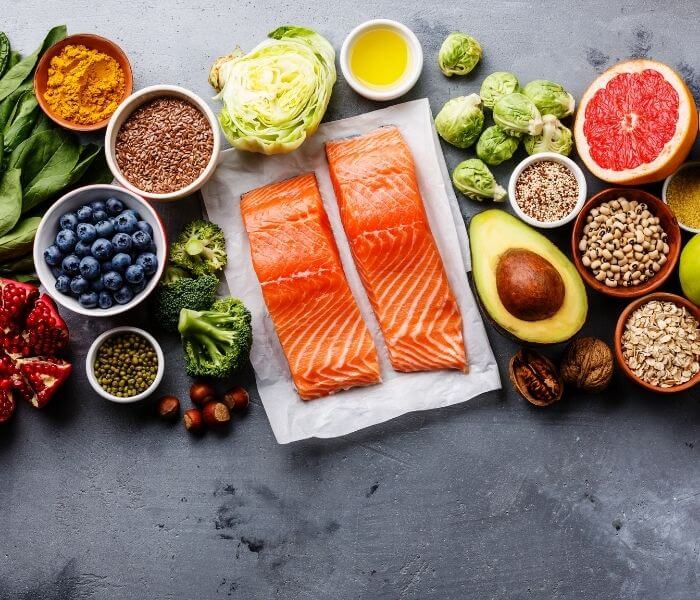5 mins read
The Importance Of A Healthy Balanced Diet

The importance of eating a healthy diet cannot be over exaggerated because it’s not just your physical health that’s reliant on what you eat but your mental health, too.
A healthy balanced diet has so many benefits including reducing the risk of developing chronic disease, helping you to recover faster from illness and maintain a healthy weight. But that’s not all. Food and your gastrointestinal tract play an important role in your state of mind.
View our Nutrition Tests and start your journey to better health today
What Is A Healthy Diet?
The term ‘healthy diet’ is bandied around all over the place, but what does it actually mean? Is an all protein diet a healthy diet, is a fasting diet a healthy diet?
To be clear, what we mean by a healthy diet is one that is:
- High in fresh fruit and vegetables along with starchy carbohydrates such as bread, rice, potatoes, and pasta.
- Contains some form of protein such as meat, fish, beans, pulses, and eggs
- Some dairy such as milk (milk alternatives such as soya), cheese and yogurts
- Low in foods that are high in fat and sugar
When it comes to planning a healthy diet, it needs to provide the correct amount of nutrients and energy to sustain the activity you do during the day. This not only includes exercise, but all other activity including housework, cycling to work, or playing with your children.
To ensure you maintain an optimum weight and have the energy you need throughout the day, then the amount of food you take in needs to equal the amount of energy your body burns throughout the day. Too little and you will lose weight which will cause your body to struggle for energy; too much and you will gain weight which will but pressure on your body’s vital organs such as your heart.
In other words, the types of foods you eat should be giving you the right amount of nutrients to support your bodily functions.
Importance Of A Balanced Diet On Your Body
Your gastrointestinal tract contains microorganisms known as gut microbiota. The gut’s microbiome is heavily influenced by what we eat throughout our entire life[i].
Our intestines contain bacteria which help support a healthy immune and metabolic system. Any imbalance in the gut microbiome as a result of a poor diet will have an impact on our intestinal bacteria resulting in poor physical as well as mental health.
Learn more on the gut brain axis.
It’s not just your mental health that benefits from a balanced diet, your physical health does too. In fact, a balanced diet provides your body with the nutrients it needs to function properly, whether that’s carbohydrates for energy, vitamin B12 and iron for healthy red blood cells or calcium for strong teeth, bones and muscle contraction.
The lack of a balanced diet leaves your body at risk of infection, illness, and disease. In the short-term, it can affect your performance, concentration and leave you feeling fatigued. The importance of eating a balanced diet during childhood is huge because without healthy food, children can experience developmental issues, illnesses, and poor performance at school.
Importance of Eating a Balanced Diet and Exercise
Having a balanced diet will ensure your body has all the necessary nutrients to provide energy, bone and muscle strength as well as having a healthy cardiovascular system.
Diet is important to exercise due to the amount of energy our bodies need to perform and recover from whatever type of exercise we choose to do.
If you are not eating sufficiently to fuel your body, particularly if you do high intensity exercise, it can lead to what’s called relative energy deficiency in sport or RED-S which is where your body shuts down non-vital functions due to the lack of energy availability to fuel all bodily functions. In women, this can result in missed periods or no periods at all.
According to the British Nutrition Foundation, having a healthy, balanced diet that fuels your body, not just for day-to-day activity, but for exercise and sport has the following benefits:
- Allows you to perform well in your chosen sport or activity
- Reduces the risk of illness and injury
- Ensures the best recovery after exercise or a training programme
Having the right foods before exercise as well as after is hugely important. If you tend to get up early to exercise, then think about how you are fuelling your body. You’ve essentially fasted for 7-8 hours while asleep, so your body needs fuel before you begin to exercise.
Carbohydrates are important for those who exercise as they are the body’s main source of energy. Following a low carbohydrate diet when exercising regularly will not provide your body with the fuel it needs to perform resulting in low energy levels. Protein is also key for your muscles, aiding muscle recovery and repair.
It’s important that you follow the standard guidelines on eating a healthy balanced diet if you exercise regularly to avoid any nutritional deficiencies that could put additional stress on your body.
Summary
A healthy, balanced diet is essential for our overall wellbeing, both physically and mentally. Our gut microbiome is heavily influenced by the food we eat, and a poor diet will lead to an imbalance in your gut’s ecosystem. This will have a knock-on effect on your physical as well as mental wellbeing.
Fuelling for sport is essential and eating the right foods before and after exercise will help provide your body with the energy it needs to perform and recovery post exercise. Enabling you to perform at your best and avoid injury and illness.
Understanding whether your body is getting the right nutrients from your diet is a great place to start. Our vitamin deficiency home blood test will check all the key nutrients important to health. Having an insight into how well your diet is fuelling your body will help you make the right changes to improve your overall wellbeing.
- Health scores calculated
Close
Article references
-
Anjum, I et al. (2018). The Role of Vitamin D in Brain Health: A Mini Literature Review. Cureus: 10(7).
-
Coppen, A and Bolander-Gouaille, C. (2005). Treatment of Depression: Time to Consider Folic Acid and Vitamin B12. J Psychpharmacol: 19(1), pp 59-65.
-
Penckofer, S et al. (2010). Vitamin D and Depression: Where Is All the Sunshine? Issues Ment Health Nurs: 31(6), pp 385-393.
-
Reid, G. (2019). Disentangling What We Know About Microbes and Mental Health. Front. Endocrinol.
-
Riviére, A et al. (2016). Bifidobacteria and Butyrate-Producing Colon Bacteria: Importance and Strategies for Their Stimulation in the Human Gut. Front. Microbiol.
This information has been medically reviewed by Dr Thom Phillips
Thom works in NHS general practice and has a decade of experience working in both male and female elite sport. He has a background in exercise physiology and has published research into fatigue biomarkers.

Dr Thom Phillips
Head of Clinical Services
Related articles
Like this article? Here are some more based on similar topics.





